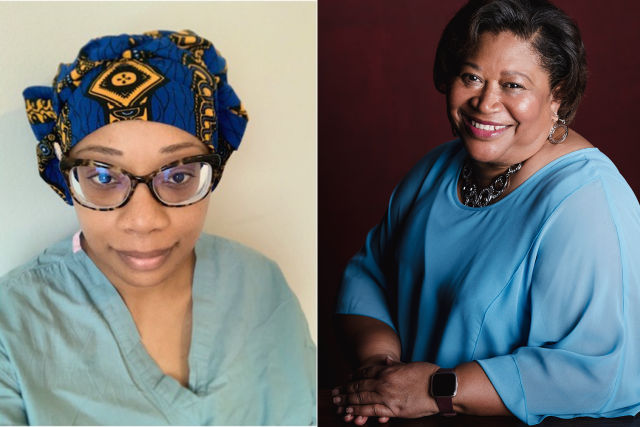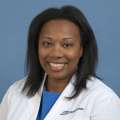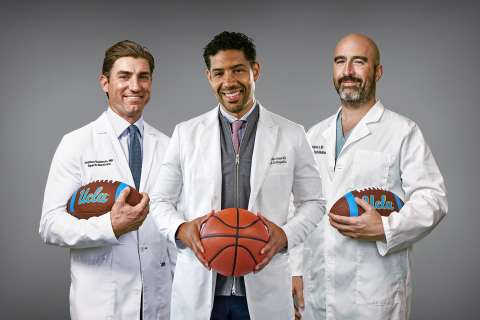For Sha'shonda Revels, MD, health equity begins with communication, trust and understanding.
Dr. Revels traces the path to her current position – assistant professor at the UCLA Division of Thoracic Surgery – and her passion for advancing health care equity, to her roots in rural Arkansas.
She saw family members with serious medical problems travel one to two hours to get the care they needed. She once saw her grandmother refuse a critical surgical procedure because she was suspicious of doctors and hospitals, owing to the nation's dark history of using Black Americans for medical experiments.
"I knew then that I wanted to be not just a physician, but one who works with underserved communities," she said. "Here we are in 2023 and we have all these advances in health care, but people in these communities still know little to nothing about them."
As a thoracic surgeon who specializes in cancer surgery, one of Dr. Revels' areas of focus is creating better awareness about lung cancer screening, particularly in Black and Latino communities where knowledge about screening and access to it is extremely lacking.
She says there are a number of quantitative studies and data about health care in underserved communities, which are then used to devise strategies, solutions and interventions.
But, Dr. Revels says, in addition to quantitative data "it is imperative that we access more granular information to better define and address issues." She believes qualitative research provides more information in that regard.
Dr. Revels is working on what she calls a "reverse study," which will start with patients and navigators in the community and health care providers in their practices as the focus to enhance what is already known from existing data. This study is being funded by UCLA's Center for the Health Improvement of Minority Elders (CHIME) and conducted at Harbor UCLA Medical Center.
"It's a human-centered design study where we put people first and ask them directly about their challenges," she said.
Working with community partners such as Celebrate Life Cancer Ministry in South Los Angeles, Dr. Revels' project is conducting phone interviews with Black and Latino patients. She’s asking them about barriers and challenges they encounter in terms of receiving quality health care.
The second phase of this study, Dr. Revels says, will be to sift through the data, determine what makes the health care system difficult for these communities, identify interventions and then test those interventions, with community participation every step of the way.
When it comes to lung cancer screening, for example, Dr. Revels says many in these communities do not know that such screening, which can reduce cancer-related deaths by 20%, even exists. Studies show that Black men have the highest mortality rate from lung cancer.
"Statistics also show patients of color have a much higher rate of survival if they are screened," Dr. Revels said, adding that one of the biggest barriers to screening has been the guidelines set forth by the United States Preventive Services Taskforce (USPSTF). The smoking and age guidelines were so stringent that they left out some of the most vulnerable populations, she said.
"This excludes women and communities of color who smoke less and still get lung cancer at higher rates at a young age," Dr. Revels said.
That's because smoking is not the only risk factor for lung cancer, she explains. Dr. Revels says one's occupation and where they live or work could also have an impact. For example, someone working in a shipyard could be at higher risk because of the presence of carcinogens such as asbestos at worksites. The USPSTF amended those guidelines in 2021, now allowing for a larger population to be included for lung cancer screening.
To get the word out about screening and to conduct her study, Dr. Revels has partnered with Pastor Rhonda Holbert, founder of Celebrate Life Cancer Ministry, which provides support and services for patients, survivors and caregivers. This includes accompanying patients during treatments, providing financial and educational resources, and even organizing social events for patients and families.
"I learned about the challenges (Dr. Revels) was facing with people not being screened and how it's too late by the time they go to her," said Holbert, who is herself a cancer survivor.
Economic and cultural barriers
One of the biggest challenges in communities of color is the distance people need to travel to get care. For example, one woman she knew had to spend $40 each way just to get to the hospital, Holbert said. For many patients, the mistrust stems from the fear of the unknown and an inability to communicate with health care providers.
"A big part of my job is to stand in the middle and bridge that gap," she says. "I have to bring humanity into the situation. Sometimes, I have to help patients see that the doctor is another human being too.
“Doctors can't read your mind; they can only read your chart. So, you communicating with the physician is as important as the physician communicating with you."
In Dr. Revels, the community not only sees someone who looks like them, but also an accomplished professional who "is knowledgeable and engaging," Holbert says.
"She came out several times on Sunday mornings and talked to the community during church," she says. "That's the kind of passion she has for people's health and well-being. She really wants to see people live and thrive. And the community has been quite receptive. Once we build such relationships, issues such as mistrust whittle away."
Dr. Revels agrees that lack of transportation and issues with communication, particularly language barriers, can pose tremendous challenges.
"It is so important for physicians to understand and appreciate these challenges," she says. "Sometimes, we hear how patients are being 'non-compliant' by not coming to appointments or staying for a certain amount of time at the hospital. Well, often, if the patient doesn't go to work, they can't pay for food or rent. This is hard to understand if you have not been in that situation.
“If people have to choose between rent, food or a doctor's appointment, that may mean us doing a phone appointment."
She has seen hospital staff and residents struggle with language barriers.
"I've seen a resident spend 45 minutes with a (Latino) patient and come out with no information because they did not think to use a Spanish-language interpreter," Dr. Revels said. "Cultural sensitivity and transcending language barriers is crucial to communication in the medical field."
She has tried to help patients overcome transportation issues. For example, she has ferried patients from their homes to hospitals for treatment using rideshare vehicles. These patients, Dr. Revels says, would not have been able to make it to the hospital or clinic otherwise. And it takes someone who has been part of that community and seen those challenges first-hand to be able to first recognize them to figure out how to overcome them.
This, Dr. Revels says, is precisely why representation matters.
Lack of representation
Thoracic surgery is an area of medicine that is dominated by white males. According to a study published in the journal Annals of Thoracic Surgery in October 2021, 63% of cardiothoracic faculty members were white compared with 70% of surgical faculty and 66% of clinical faculty.
Black and Latino physicians were only 3% and 5% of cardiothoracic faculty, respectively, similar figures to surgical and clinical faculty. Also, 66% of cardiothoracic residents were white, and only 4% of residents in this field were Black and 5% were Latino.
Dr. Revels says this can be solved only by reaching out to prospective students at the high school or even at the elementary school level. Revels, who grew up in the Inland Empire, said she came to UCLA because of such outreach when she was in high school. As a resident at UCLA, she received trust, respect and mentorship, all of which opened doors to opportunities.
"They taught me as they would've taught anyone else even though I was the only Black person in that group," she said. "I had the same expectations as everyone else. They believed I could do it, and that meant a lot."
But inequality and inequity in health care is causing loss of life and it is Dr. Revels' goal to prevent such tragedies.
"There are 60,000 excess deaths in cancer in the 25 to 65 age group (in a year) just related to race and economic status," she said. "That, to me, is unacceptable and has to change."




